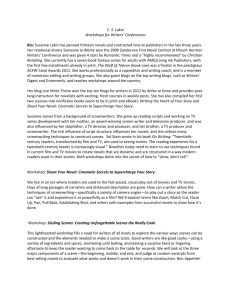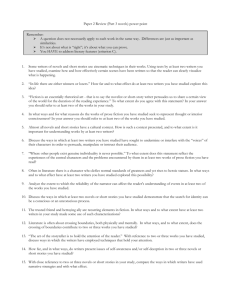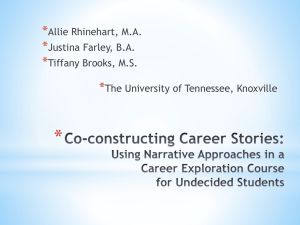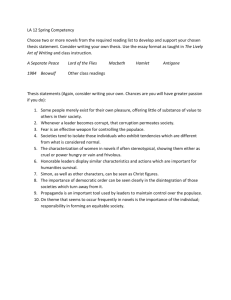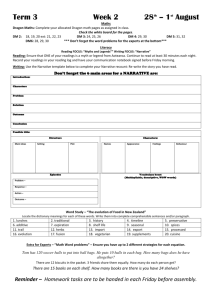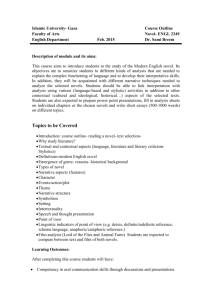IB Exam Prepper - Vance Cameron Holmes
advertisement
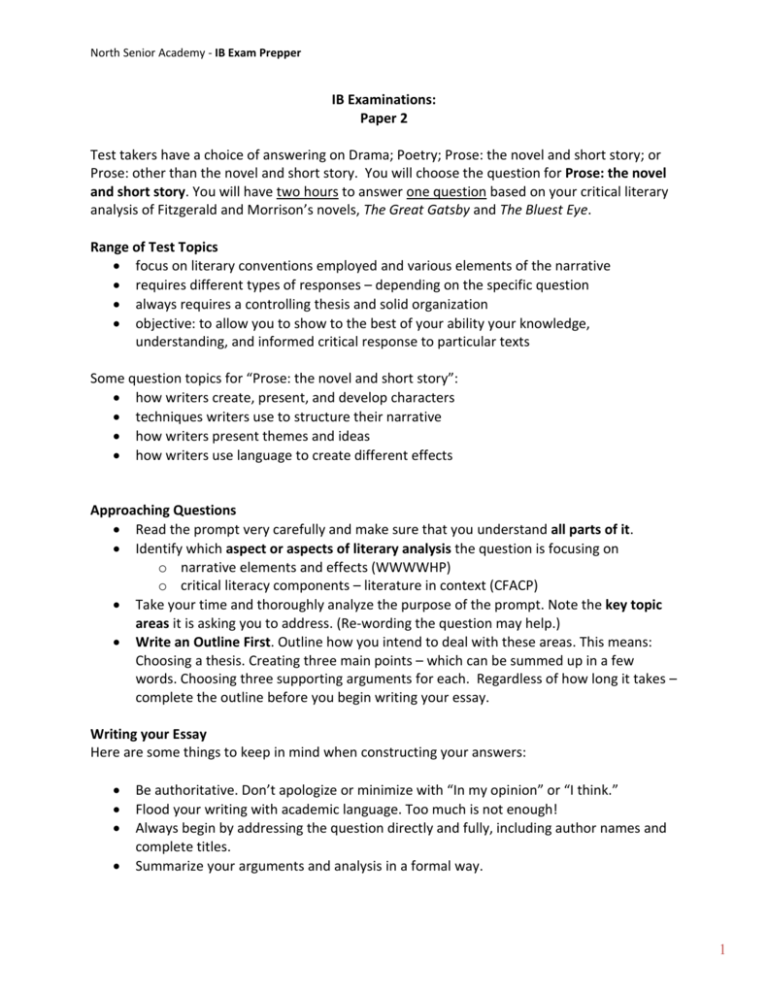
North Senior Academy - IB Exam Prepper IB Examinations: Paper 2 Test takers have a choice of answering on Drama; Poetry; Prose: the novel and short story; or Prose: other than the novel and short story. You will choose the question for Prose: the novel and short story. You will have two hours to answer one question based on your critical literary analysis of Fitzgerald and Morrison’s novels, The Great Gatsby and The Bluest Eye. Range of Test Topics focus on literary conventions employed and various elements of the narrative requires different types of responses – depending on the specific question always requires a controlling thesis and solid organization objective: to allow you to show to the best of your ability your knowledge, understanding, and informed critical response to particular texts Some question topics for “Prose: the novel and short story”: how writers create, present, and develop characters techniques writers use to structure their narrative how writers present themes and ideas how writers use language to create different effects Approaching Questions Read the prompt very carefully and make sure that you understand all parts of it. Identify which aspect or aspects of literary analysis the question is focusing on o narrative elements and effects (WWWWHP) o critical literacy components – literature in context (CFACP) Take your time and thoroughly analyze the purpose of the prompt. Note the key topic areas it is asking you to address. (Re-wording the question may help.) Write an Outline First. Outline how you intend to deal with these areas. This means: Choosing a thesis. Creating three main points – which can be summed up in a few words. Choosing three supporting arguments for each. Regardless of how long it takes – complete the outline before you begin writing your essay. Writing your Essay Here are some things to keep in mind when constructing your answers: Be authoritative. Don’t apologize or minimize with “In my opinion” or “I think.” Flood your writing with academic language. Too much is not enough! Always begin by addressing the question directly and fully, including author names and complete titles. Summarize your arguments and analysis in a formal way. 1 North Senior Academy - IB Exam Prepper Assume the reader has read the novels. Don’t explain Fitzgerald and Morrison’s plots – explain your thoughts. Stick to your outline. You are scored on good ideas and solid organization– not on answer length. Stick to your outline. Regardless of how short or long your answer ends up being, stick to your thesis and outline. Technical accuracy: proof your paper and make it free from technical errors. Sample: Addressing an Exam Prompt Sample Question: “Some novelists invite the reader to experience the fictional world from inside the consciousness of one or more of the characters; other novelists remain omniscient. Neither method is better in itself: the sole concern is how well the narrative method fulfills the author’s particular purposes.” Discuss either or both of these kinds of narrative technique in relation to their appropriateness in two or three of the novels you have studied. 1. Decide what you are being asked to do. Identify the key topic areas to be addressed in your essay. (a) “Some novelists invite the reader to [experience the world from inside the (a) consciousness of one or more of the characters]; other novelists remain omniscient. (b) Neither method is better in itself: [the sole concern is how well the narrative method (b) fulfills the author’s particular purposes.]” Discuss with respect to The Great Gatsby and The Bluest Eye. 2. Now re-word the sentence into a question (or questions) which you will aim to answer through your thesis statement and outline. a. What ARE these authors’ particular purposes? b. How WELL does their chosen narrative method fulfill their purposes? 2 North Senior Academy - IB Exam Prepper Sample Exam Questions 1. Discuss the ways in which at least two authors have used minor characters as a technique in their writing. 2. How, and to what extent, have two or three of the works you have studied been concerned with the individuals within a society? 3. Literature consists of victors and victims. Discuss how the idea of victors and victims has been presented in at least two works you have studied. 4. How far has the presentation of the narratives you have studied departed from the chronological? Looking at two or three works, consider how appropriate the sequence of the narrative is to what each work is about. 5. Compare and contrast the role and importance of point of view in two or three works you have studied. 6. Discuss the interplay between setting and action as part of the meaning of the novels you have read. 7. How, and to what ends, have authors incorporated family relationships into at least two works you have studied? 8. “It was the best of times, it was the worst of times, it was the age of wisdom, it was the age of foolishness, it was the epoch of belief, it was the epoch of incredulity, it was the season of Light, it was the season of Darkness, it was the spring of hope, it was the winter of despair.” Openings are crucial to works of literature. Discuss in detail the way in which the three authors we have studied have used openings within their novels. What are the different effects achieved? 9. “In the end is my beginning.” This is a statement made by an author to describe how he organizes his work. What do you understand by the sentence, and how does it cast light on the literary strategies employed in the three works we have studied? 10. “Not rounding off, but opening out.” Comment upon the way the writers of the novel and short story deal with the ending in relation to the whole. In your answer you should refer to two or three novels or short stories you have studied. 11. Some novels draw attention to the fact that they are inventions or constructions of the writer; others seek to conceal this artifice. Consider chosen novels in the light of this distinction, and say what the procedures adopted add to the effect of underlining or concealing the fictional status of the writing. 3 North Senior Academy - IB Exam Prepper 12. Authors use the portrayal of characters who are somehow trapped or imprisoned as a means to criticize society. Referring closely to at least two of the works from your study, show to what extent and in what ways this statement is true. 13. “Some novelists invite the reader to experience the fictional world from inside the consciousness of one or more of the characters; other novelists remain omniscient. Neither method is better in itself: the sole concern is how well the narrative method fulfills the author’s particular purposes.” Discuss either or both of these kinds of narrative technique in relation to their appropriateness in two or three of the novels you have studied. 14. Examine the ways in which rebels, outsiders or characters alienated in some other way from their societies have been presented in the works you have studied. 4
